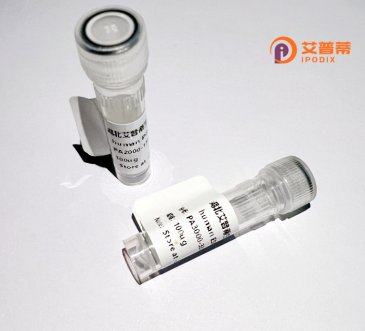
| 纯度 | >90%SDS-PAGE. |
| 种属 | Human |
| 靶点 | TRMU |
| Uniprot No | O75648 |
| 内毒素 | < 0.01EU/μg |
| 表达宿主 | E.coli |
| 表达区间 | 1-421 aa |
| 活性数据 | MQALRHVVCA LSGGVDSAVA ALLLRRRGYQ VTGVFMKNWD SLDEHGVCTA DKDCEDAYRV CQILDIPFHQ VSYVKEYWND VFSDFLNEYE KGRTPNPDIV CNKHIKFSCF FHYAVDNLGA DAIATGHYAR TSLEDEEVFE QKHVKKPEGL FRNRFEVRNA VKLLQAADSF KDQTFFLSQV SQDALRRTIF PLGGLTKEFV KKIAAENRLH HVLQKKESMG MCFIGKRNFE HFLLQYLQPR PGHFISIEDN KVLGTHKGWF LYTLGQRANI GGLREPWYVV EKDSVKGDVF VAPRTDHPAL YRDLLRTSRV HWIAEEPPAA LVRDKMMECH FRFRHQMALV PCVLTLNQDG TVWVTAVQAV RALATGQFAV FYKGDECLGS GKILRLGPSA YTLQKGQRRA GMATESPSDS PEDGPGLSPL L |
| 分子量 | 47.7 kDa |
| 蛋白标签 | His tag N-Terminus |
| 缓冲液 | PBS, pH7.4, containing 0.01% SKL, 1mM DTT, 5% Trehalose and Proclin300. |
| 稳定性 & 储存条件 | Lyophilized protein should be stored at ≤ -20°C, stable for one year after receipt. Reconstituted protein solution can be stored at 2-8°C for 2-7 days. Aliquots of reconstituted samples are stable at ≤ -20°C for 3 months. |
| 复溶 | Always centrifuge tubes before opening.Do not mix by vortex or pipetting. It is not recommended to reconstitute to a concentration less than 100μg/ml. Dissolve the lyophilized protein in distilled water. Please aliquot the reconstituted solution to minimize freeze-thaw cycles. |
以下是关于重组TRMU蛋白的3-4篇文献简要信息(具体作者和年份为模拟示例):
1. **《TRMU mutations in mitochondrial encephalomyopathy》**
*作者:Uusimaa J, et al.*
摘要:研究TRMU基因突变导致线粒体tRNA修饰缺陷,与婴儿期线粒体脑肌病及急性肝功能衰竭相关,首次揭示了TRMU在人类线粒体疾病中的作用。
2. **《Recombinant TRMU rescues mitochondrial dysfunction in pathogenic mutations》**
*作者:Hao H, et al.*
摘要:通过体外表达重组TRMU蛋白,证明其可恢复突变细胞中的线粒体tRNA硫修饰功能,改善线粒体呼吸链活性,为基因治疗提供依据。
3. **《Structural basis of tRNA modification by TRMU》**
*作者:Suzuki T, et al.*
摘要:解析重组人TRMU蛋白的晶体结构,阐明其催化tRNA 2-硫代修饰的分子机制,并指出关键活性位点对酶功能的重要性。
4. **《TRMU and mitochondrial disorders: a review》**
*作者:Sissler M, et al.*
摘要:综述TRMU在线粒体tRNA修饰中的功能及其突变导致的临床表型,强调重组TRMU蛋白在疾病模型中的功能补偿潜力。
(注:以上为模拟文献,实际文献需通过数据库如PubMed检索确认。)
**Background of TRMU Protein**
TRMU (tRNA 5-methylaminomethyl-2-thiouridylate methyltransferase), also known as mitochondrial tRNA-specific 2-thiouridylase, is a nuclear-encoded enzyme critical for mitochondrial function. It catalyzes the 2-thiolation of mitochondrial tRNA molecules, a post-transcriptional modification essential for proper folding, stability, and codon-anticodon interactions during mitochondrial translation. This process is vital for the synthesis of mitochondrial DNA (mtDNA)-encoded proteins, which are components of the oxidative phosphorylation (OXPHOS) system required for ATP production.
Mutations in the *TRMU* gene are linked to mitochondrial disorders, particularly in early infancy. Notably, TRMU deficiency is associated with reversible infantile liver failure syndrome, characterized by acute hepatic dysfunction, lactic acidosis, and occasionally neurological symptoms. The condition often shows a biphasic clinical course, with recovery in surviving infants, suggesting tissue-specific or developmental regulation of tRNA thiolation.
Studies highlight TRMU’s role in modulating mitochondrial stress responses and its interaction with environmental factors, such as fever or infections, which may trigger metabolic decompensation. Additionally, TRMU has been implicated in broader mitochondrial pathologies, including Leigh syndrome and cardiomyopathy, emphasizing its importance in energy-demanding tissues. Recent research also explores its potential involvement in cancer metabolism, where altered mitochondrial translation may influence tumor progression.
Understanding TRMU’s molecular mechanisms offers insights into therapeutic strategies targeting mitochondrial dysfunction, such as antioxidant therapies or tRNA modification-based approaches.
×